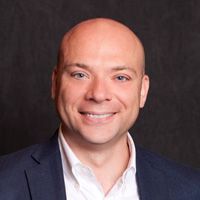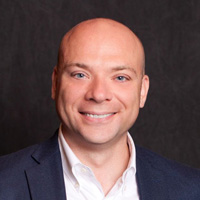Is Your Beneficiary Ready to Receive Money?
If you have any reservations about who you have in mind when writing your will, whether you're thinking about a young child or even an older person who could be vulnerable to scams, a trust could make a lot of sense.

Profit and prosper with the best of Kiplinger's advice on investing, taxes, retirement, personal finance and much more. Delivered daily. Enter your email in the box and click Sign Me Up.
You are now subscribed
Your newsletter sign-up was successful
Want to add more newsletters?

Delivered daily
Kiplinger Today
Profit and prosper with the best of Kiplinger's advice on investing, taxes, retirement, personal finance and much more delivered daily. Smart money moves start here.

Sent five days a week
Kiplinger A Step Ahead
Get practical help to make better financial decisions in your everyday life, from spending to savings on top deals.

Delivered daily
Kiplinger Closing Bell
Get today's biggest financial and investing headlines delivered to your inbox every day the U.S. stock market is open.

Sent twice a week
Kiplinger Adviser Intel
Financial pros across the country share best practices and fresh tactics to preserve and grow your wealth.

Delivered weekly
Kiplinger Tax Tips
Trim your federal and state tax bills with practical tax-planning and tax-cutting strategies.

Sent twice a week
Kiplinger Retirement Tips
Your twice-a-week guide to planning and enjoying a financially secure and richly rewarding retirement

Sent bimonthly.
Kiplinger Adviser Angle
Insights for advisers, wealth managers and other financial professionals.

Sent twice a week
Kiplinger Investing Weekly
Your twice-a-week roundup of promising stocks, funds, companies and industries you should consider, ones you should avoid, and why.

Sent weekly for six weeks
Kiplinger Invest for Retirement
Your step-by-step six-part series on how to invest for retirement, from devising a successful strategy to exactly which investments to choose.
Losing a loved one is an emotional experience. It’s not something we like to think about, but there are many things we can do to prepare for our family members’ care. One way to make sure the next generation is cared for is to leave a financial legacy.
Consider, however, that not everyone will be mentally or emotionally prepared for the money you wish to leave them.
Consider Age
Children under 18 years old are not able to sign legal contracts. Minors can open a custodial checking account with a parent, but insurance companies, financial companies and the court will not release large sums to children in their own names. Without some preparation, the court system will become involved and will take custody of the funds on the child’s behalf. This could happen through custody accounts, protective orders or conservatorships. Perhaps worse, there is little control over how the money will be used, and the conservatorship will generally be closed and paid to the child when they become an adult, which is age 18 or 21, depending on the state.
From just $107.88 $24.99 for Kiplinger Personal Finance
Become a smarter, better informed investor. Subscribe from just $107.88 $24.99, plus get up to 4 Special Issues

Sign up for Kiplinger’s Free Newsletters
Profit and prosper with the best of expert advice on investing, taxes, retirement, personal finance and more - straight to your e-mail.
Profit and prosper with the best of expert advice - straight to your e-mail.
Our prefrontal cortex, which is the part of the brain responsible for rational decision-making, isn’t fully developed until around age 25. Giving substantial financial resources to those who are not cognitively ready for this responsibility often ends with poor decision-making at best and self-harm at worst. For example, consider sudden access to addictive substances or the ability to run a craps table at the local casino (both are scenarios I have witnessed).
Look at Lifestyle
Inheritance and planning considerations don’t stop with the issue of age. Plenty of other circumstances need to be considered and planned for:
- What happens if a beneficiary has an existing substance abuse or gambling problem?
- What happens to that beneficiary and their inheritance if they end up in an abusive relationship?
- What if the beneficiary is being sued or getting divorced?
- What if the beneficiary has a disability?
- What about those beneficiaries who just aren’t up to managing their own assets?
Fortunately, all of these issues and more can be addressed with the help of an estate planning attorney. A testamentary trust can be created to ensure minors (and adults who just may not be ready) do not receive money too soon, while also making sure they have funds available to help with school, health care and life expenses.
Make sure to find out who will manage the trust; a trust needs a trustee, and you will have to find someone willing to do the work. Many professional trust companies won’t get involved in the administration of a trust unless the trust contains at least a certain amount of assets. A company may also avoid working with trusts that involve certain complexities, such as requiring a beneficiary to test for substances prior to accessing funds. The right trustee will distribute funds only in the ways you have decided, which could be for anything from education to home purchases to vacations to rehab.
Trusts like these typically have the added benefit of being spendthrift trusts. Because a spendthrift trust is not “owned” by the beneficiary directly, creditors have a difficult time reaching the assets. This can protect the trust from lawsuits, bankruptcies and divorces. It also keeps the funds out of the hands of manipulative family members and friends.
I once worked with an elderly spouse whose wife had passed away years earlier. She knew he was kind and sometimes too generous with those who came into his life. She created a spendthrift trust for his benefit. As professional corporate trustee for a bank, we were able to act as a go-between. In order to access money, he would have to speak with us first. We were able to dissuade him from giving money to any number of scams and phishing attempts, which were more frequent as he grew older.
Review Often
It’s important to review your estate plan after major life events or every few years. If you have more children, get married, divorced, have a falling out with a family member, buy or sell a home or experience a substantial change in your assets, it’s time to update.
Parents and grandparents should also consider what’s going on in the lives of their children and grandchildren. If you created the will or trust when your children were young, their values and priorities have probably changed. Make sure your plan is still effective and will accomplish what you hope to accomplish.
Trusts can be complicated, but they don’t have to feel that way. Contact a qualified estate planning attorney in your state to make the process easier and to ensure your money goes to the right people at the right time.
Profit and prosper with the best of Kiplinger's advice on investing, taxes, retirement, personal finance and much more. Delivered daily. Enter your email in the box and click Sign Me Up.

Philip J. Ruce is a Minnesota estate planning attorney at Stone Arch Law Office, PLLC. Philip places a premium on a high level of client service and loyalty. Philip's trust and fiduciary research has been published by universities around the country. Philip is a graduate of the University of Minnesota (B.A.), William Mitchell College of Law (J.D.), and Thomas Jefferson School of Law (LL.M.). Philip is married with two children.
-
 Nasdaq Leads a Rocky Risk-On Rally: Stock Market Today
Nasdaq Leads a Rocky Risk-On Rally: Stock Market TodayAnother worrying bout of late-session weakness couldn't take down the main equity indexes on Wednesday.
-
 Quiz: Do You Know How to Avoid the "Medigap Trap?"
Quiz: Do You Know How to Avoid the "Medigap Trap?"Quiz Test your basic knowledge of the "Medigap Trap" in our quick quiz.
-
 5 Top Tax-Efficient Mutual Funds for Smarter Investing
5 Top Tax-Efficient Mutual Funds for Smarter InvestingMutual funds are many things, but "tax-friendly" usually isn't one of them. These are the exceptions.
-
 Social Security Break-Even Math Is Helpful, But Don't Let It Dictate When You'll File
Social Security Break-Even Math Is Helpful, But Don't Let It Dictate When You'll FileYour Social Security break-even age tells you how long you'd need to live for delaying to pay off, but shouldn't be the sole basis for deciding when to claim.
-
 I'm an Opportunity Zone Pro: This Is How to Deliver Roth-Like Tax-Free Growth (Without Contribution Limits)
I'm an Opportunity Zone Pro: This Is How to Deliver Roth-Like Tax-Free Growth (Without Contribution Limits)Investors who combine Roth IRAs, the gold standard of tax-free savings, with qualified opportunity funds could enjoy decades of tax-free growth.
-
 One of the Most Powerful Wealth-Building Moves a Woman Can Make: A Midcareer Pivot
One of the Most Powerful Wealth-Building Moves a Woman Can Make: A Midcareer PivotIf it feels like you can't sustain what you're doing for the next 20 years, it's time for an honest look at what's draining you and what energizes you.
-
 I'm a Wealth Adviser Obsessed With Mahjong: Here Are 8 Ways It Can Teach Us How to Manage Our Money
I'm a Wealth Adviser Obsessed With Mahjong: Here Are 8 Ways It Can Teach Us How to Manage Our MoneyThis increasingly popular Chinese game can teach us not only how to help manage our money but also how important it is to connect with other people.
-
 Looking for a Financial Book That Won't Put Your Young Adult to Sleep? This One Makes 'Cents'
Looking for a Financial Book That Won't Put Your Young Adult to Sleep? This One Makes 'Cents'"Wealth Your Way" by Cosmo DeStefano offers a highly accessible guide for young adults and their parents on building wealth through simple, consistent habits.
-
 Global Uncertainty Has Investors Running Scared: This Is How Advisers Can Reassure Them
Global Uncertainty Has Investors Running Scared: This Is How Advisers Can Reassure ThemHow can advisers reassure clients nervous about their plans in an increasingly complex and rapidly changing world? This conversational framework provides the key.
-
 I'm a Real Estate Investing Pro: This Is How to Use 1031 Exchanges to Scale Up Your Real Estate Empire
I'm a Real Estate Investing Pro: This Is How to Use 1031 Exchanges to Scale Up Your Real Estate EmpireSmall rental properties can be excellent investments, but you can use 1031 exchanges to transition to commercial real estate for bigger wealth-building.
-
 Should You Jump on the Roth Conversion Bandwagon? A Financial Adviser Weighs In
Should You Jump on the Roth Conversion Bandwagon? A Financial Adviser Weighs InRoth conversions are all the rage, but what works well for one household can cause financial strain for another. This is what you should consider before moving ahead.